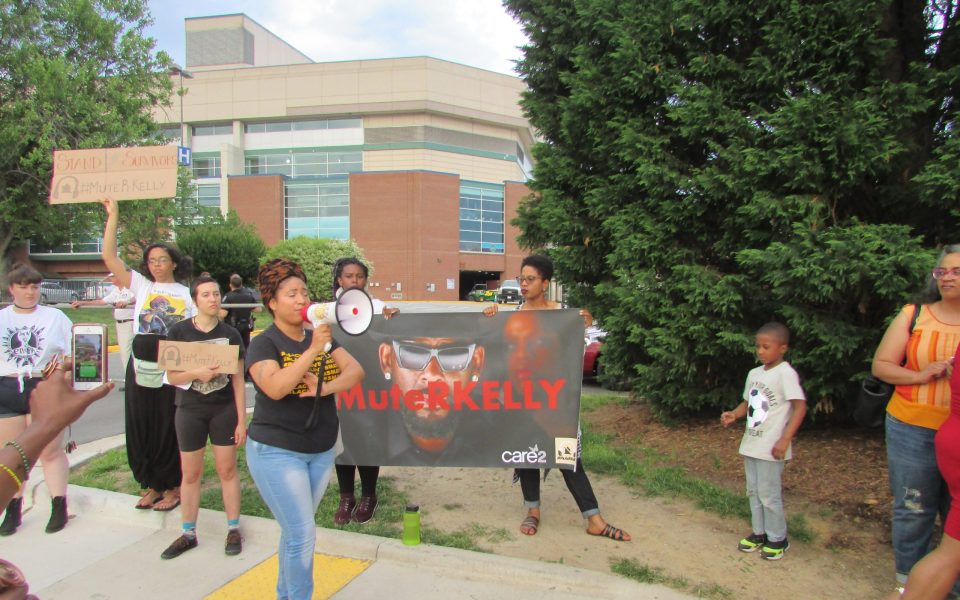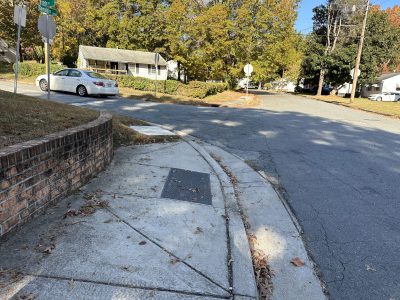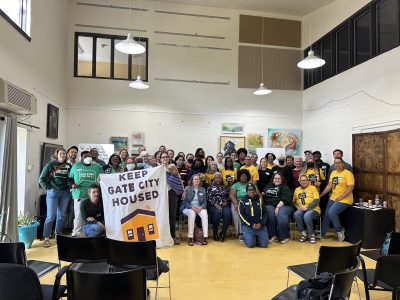Omisade Burney-Scott stood in the middle of a circle of mostly women, some transgender people, and a small number of men, on a grassy patch near Stamey’s Barbecue.
“We want to make sure that folk know that in this city of Greensboro, that in North Carolina, we believe black women, we trust black women, we are not going to allow folk to stand here and say that, ‘Hey, this is not a big deal’ — it is a big deal,” said Burney-Scott, who is the director of strategic partnerships at SisterSong, a Durham nonprofit that supports reproductive justice. “And we are no longer going to stand on the sidelines and say that we are no longer going to do anything about that.”
About 35 people showed up to picket R. Kelly’s performance at the Greensboro Coliseum on Friday as part of the #MuteRKelly campaign to pressure the music industry to sever financial ties with the R&B singer who has been accused of a decades-long pattern of sexual abuse.
Despite the fact that management at the city-owned coliseum did not heed calls to cancel the concert, there are signs of momentum in the effort to hold Kelly accountable. Burney-Scott said that the campaign began about a year ago with an effort by two women in Atlanta to get Kelly’s concert canceled. Then a May 5 concert in Chicago was canceled. And then, in quick succession, Spotify, Pandora and Apple Music reportedly removed some of Kelly’s songs from their streaming services in the past couple days. And on Thursday, the Greensboro Human Relations Commission voted 6-1 to recommend Kelly not be allowed to perform at the coliseum.
Yet the concert went on as scheduled. Andrew Brown, spokesman for the Greensboro Coliseum Complex, estimated attendance was about 5,000, similar to the last time the artist performed at the venue in 2016. The coliseum otherwise declined to comment on the calls for cancelation.
Before the protest group crossed Gate City Boulevard to demonstrate in front of the coliseum, Burney-Scott warned that their message might not be universally well received.
“We know that there might be some really funky-ass attitudes out here tonight,” she said. “Look, keep yourself safe. Don’t engage.” She added that if people wished they could hand out one-page fliers that explained why they were protesting.
Later, a few concertgoers politely accepted the fliers. Reaction from some passing motorists was rougher, with some people flipping the middle finger or vocalizing mocking laughter.
Some protesters expressed a sense of betrayal towards the fans who purchased tickets to the concert.
“We now know that there are 5,000 more people in the city of Greensboro and the Triad area that we can’t trust,” Brandi Collins-Calhoun said. “There are 5,000 people who purchased tickets and put money in his pockets for him to continue to oppress and abuse young, black women and girls. And it’s really important that we uplift that in a few weeks there’s gonna be a circus in the same auditorium that a predator is inside of right now. It’s important to uplift that tomorrow people who have paid thousands of dollars to attend college in this city are going to walk across the stage where there’s a predator tonight.”
Kelly has denied allegations that he abused women and kept them in sexual servitude.
Collins-Calhoun published an open letter earlier this week calling on the coliseum to cancel the concert. Similar to the resolution passed by the human relations commission, Collins-Calhoun said she plans to address Greensboro City Council next Tuesday to ask for a policy that sets a community standard for performances at the city-owned venue. She added that in the meantime she doesn’t intend to spend any of her money at the coliseum, and didn’t think anyone else at the protest would either.
“Getting a justice policy so they don’t keep bringing predators to our town [is the aim],” Collins-Calhoun said. “And also holding white men just as accountable. Sex offenders shouldn’t make money, no matter how famous they are. After all, it’s their fame that allows them to continue to commit these crimes.”
Asked in an interview what threshold for objectionable behavior and proof of misconduct should be applied, Collins-Calhoun responded, “One victim is enough.”
Cherizar Crippen, an organizer with Black Lives Matter, said the patrons who bought tickets to see Kelly remind her of the adults who didn’t believe her when she tried to tell them about the sexual abuse she experienced as a teenager.
“I was a teenage girl who went through countless experiences of sexual assault,” Crippen said. “The black women who are coming to this concert are, to me, the same as the women I went to who didn’t support me. It’s not just about R. Kelly; we have to hold the boys and men in our neighborhoods accountable, too. People say there was consent. You can’t have consent when there’s manipulation and coercion involved, and drugs and alcohol.”
Although most of the speakers and attendees at the protest in Greensboro were women, Irving Allen, a member of the Greensboro Human Relations Commission and Black Lives Matter organizer, said men have to take responsibility for changing the culture.
“I’m just committing to be more active and to do better on my behalf of getting more folks like myself out here to give their voices, their power and their talent to this cause,” he said.
Kelly is scheduled to appear at the Level Nightclub in Raleigh tomorrow for an event billed as a “pre-Mother’s Day bash” and “official afterparty.”
While most of the commentary during the protest focused on misconduct by men, Burney-Scott alluded to the role of white supremacy in promoting sexual abuse and violence directed at black women.
“I’m standing here today because my great-grandmother was sexually assaulted by her employer, causing her to give birth to my grandmother,” Burney-Scott said. “I’m here because one in four women have been violated by sexual violence and sexual assault. I’m here because black women, cisgender and transgender, are not listened to. I’m standing here myself. I’m standing here for my great-grandmother. I’m standing for these children who got spanked because they spent too much time in the kitchen with a sexual predator who still gets to come to the damn cookout.”
Then she turned her attention to R. Kelly.
“He will never be able to come to this city again,” Burney-Scott vowed. “He will never be able to come to this state again. His venues are going to dry up. His revenue is going to dry up. He’s going to be moving from shadow to shadow.”
Join the First Amendment Society, a membership that goes directly to funding TCB‘s newsroom.
We believe that reporting can save the world.
The TCB First Amendment Society recognizes the vital role of a free, unfettered press with a bundling of local experiences designed to build community, and unique engagements with our newsroom that will help you understand, and shape, local journalism’s critical role in uplifting the people in our cities.
All revenue goes directly into the newsroom as reporters’ salaries and freelance commissions.





Leave a Reply